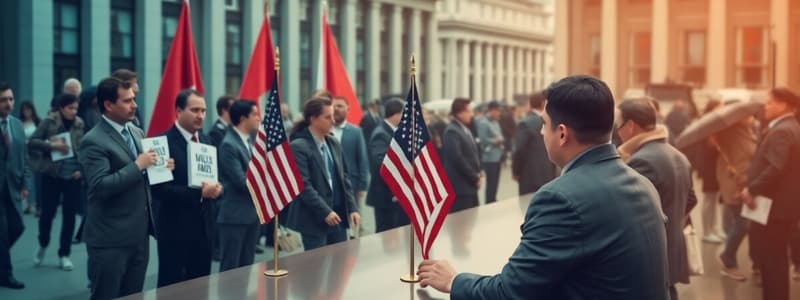Podcast
Questions and Answers
What role does EU competition law play in the marketplace?
What role does EU competition law play in the marketplace?
- It maintains a fair and open marketplace by preventing anti-competitive behavior. (correct)
- It facilitates mergers and acquisitions.
- It promotes monopolistic practices.
- It restricts the growth of businesses.
Which principles form the economic constitution of Spain as per its constitution?
Which principles form the economic constitution of Spain as per its constitution?
- Right to private property and freedom of enterprise. (correct)
- Right to government ownership and freedom of contract.
- Right to collective property and freedom of capital movement.
- Right to personal wealth and freedom from taxation.
What was a significant factor in Spain's economic transformation toward a market-oriented economy?
What was a significant factor in Spain's economic transformation toward a market-oriented economy?
- Increased public sector management.
- Strengthening state control over key sectors.
- Promotion of economic freedoms and free competition by the EU. (correct)
- The expansion of royal factories.
According to Article 33 of the Spanish Constitution, what is the nature of the right to private property?
According to Article 33 of the Spanish Constitution, what is the nature of the right to private property?
What does the balancing act between private ownership and public interest aim to achieve?
What does the balancing act between private ownership and public interest aim to achieve?
What was the historical context of economic intervention in Spain?
What was the historical context of economic intervention in Spain?
What does Article 38 of the Spanish Constitution recognize?
What does Article 38 of the Spanish Constitution recognize?
What is essential for tourism development in Spain to align with national economic goals?
What is essential for tourism development in Spain to align with national economic goals?
Which of the following correctly describes the concept of economic liberalization in Spain?
Which of the following correctly describes the concept of economic liberalization in Spain?
In the context of Spanish tourism governance, what does CC.AA. stand for?
In the context of Spanish tourism governance, what does CC.AA. stand for?
What does the multi-level governance model in Spain enable in the tourism sector?
What does the multi-level governance model in Spain enable in the tourism sector?
What distinguishes inclusive economic structures from extractive economic structures?
What distinguishes inclusive economic structures from extractive economic structures?
Which of the following instruments is primarily used to regulate the money supply and interest rates?
Which of the following instruments is primarily used to regulate the money supply and interest rates?
What typically triggers long economic cycles as defined by Schumpeter?
What typically triggers long economic cycles as defined by Schumpeter?
What principle is vital for fostering an integrated internal market in the EU?
What principle is vital for fostering an integrated internal market in the EU?
Which article of the TFEU explicitly prohibits restrictions on imports between EU member states?
Which article of the TFEU explicitly prohibits restrictions on imports between EU member states?
Which factor is NOT typically included in the determinants that influence the economic landscape?
Which factor is NOT typically included in the determinants that influence the economic landscape?
What kind of cycles reflect changes in demand due to external factors in the tourism market?
What kind of cycles reflect changes in demand due to external factors in the tourism market?
What is the primary goal of fiscal policy in economic intervention?
What is the primary goal of fiscal policy in economic intervention?
Which macro-economic indicator is defined as the difference between a country’s exports and imports?
Which macro-economic indicator is defined as the difference between a country’s exports and imports?
What does the free movement of capital aim to achieve within the EU?
What does the free movement of capital aim to achieve within the EU?
Which category of employment includes individuals who are not actively seeking job opportunities?
Which category of employment includes individuals who are not actively seeking job opportunities?
Why is EU competition law important for the single market?
Why is EU competition law important for the single market?
Which measure is commonly taken to correct market distortions?
Which measure is commonly taken to correct market distortions?
What is a primary effect of inflation on the economy?
What is a primary effect of inflation on the economy?
What does the EU aim to promote through its fundamental economic freedoms?
What does the EU aim to promote through its fundamental economic freedoms?
What characterizes macroeconomics as distinct from microeconomics?
What characterizes macroeconomics as distinct from microeconomics?
What does qualitative unemployment refer to in the labor market?
What does qualitative unemployment refer to in the labor market?
What is a common challenge faced by economic policymakers?
What is a common challenge faced by economic policymakers?
Which of the following is NOT a recognized instrument for public intervention in the economy?
Which of the following is NOT a recognized instrument for public intervention in the economy?
Which is NOT a reason for public intervention in the economy?
Which is NOT a reason for public intervention in the economy?
What is the significance of property rights in a market economy as defined by the Spanish Constitution?
What is the significance of property rights in a market economy as defined by the Spanish Constitution?
What must be balanced with economic rights to foster investment and economic stability?
What must be balanced with economic rights to foster investment and economic stability?
What does Article 38 protect regarding economic freedom?
What does Article 38 protect regarding economic freedom?
Which philosopher’s ideas emphasize the role of democratic processes in guiding economic policies?
Which philosopher’s ideas emphasize the role of democratic processes in guiding economic policies?
What is necessary for ongoing coordination in industries like tourism?
What is necessary for ongoing coordination in industries like tourism?
What was a significant early milestone in public intervention in tourism in Spain?
What was a significant early milestone in public intervention in tourism in Spain?
What are key policy tools mentioned for addressing market imperfections?
What are key policy tools mentioned for addressing market imperfections?
What aspect of economic goals is NOT mentioned in the content?
What aspect of economic goals is NOT mentioned in the content?
Why is public intervention considered crucial in the tourism sector?
Why is public intervention considered crucial in the tourism sector?
What is the primary role of competition law in the EU?
What is the primary role of competition law in the EU?
Which articles of the TFEU reinforce the EU's commitment to economic integration?
Which articles of the TFEU reinforce the EU's commitment to economic integration?
What does the free movement of workers promote under Article 45 TFEU?
What does the free movement of workers promote under Article 45 TFEU?
What actions can the European Commission take against firms violating competition law?
What actions can the European Commission take against firms violating competition law?
Which of the following is NOT considered an anti-competitive practice under EU law?
Which of the following is NOT considered an anti-competitive practice under EU law?
What is the purpose of reducing administrative and legal barriers in the EU?
What is the purpose of reducing administrative and legal barriers in the EU?
How does EU competition law affect labor markets?
How does EU competition law affect labor markets?
What is the consequence of a firm abusing its dominant market position?
What is the consequence of a firm abusing its dominant market position?
Flashcards
Layered governance in Spanish tourism
Layered governance in Spanish tourism
The distribution of responsibilities for tourism development in Spain is a layered process involving the national government, regional governments (CC.AA.), and local administrations.
Alignment of tourism with various levels of government
Alignment of tourism with various levels of government
National goals, regional priorities, and local interests are all considered when developing tourism policies. Each level of government helps ensure that tourism aligns with these different needs.
Fundamental economic freedoms in the EU
Fundamental economic freedoms in the EU
The European Union promotes a single market that enables goods, services, capital, and people to move freely between member states.
Free movement of goods in the EU
Free movement of goods in the EU
Signup and view all the flashcards
Free movement of capital in the EU
Free movement of capital in the EU
Signup and view all the flashcards
EU Competition Law
EU Competition Law
Signup and view all the flashcards
Article 34 TFEU and free movement of goods
Article 34 TFEU and free movement of goods
Signup and view all the flashcards
Article 63 TFEU and free movement of capital
Article 63 TFEU and free movement of capital
Signup and view all the flashcards
Dominant firm abuse
Dominant firm abuse
Signup and view all the flashcards
Free movement of workers
Free movement of workers
Signup and view all the flashcards
Wage-fixing or no-poaching agreements
Wage-fixing or no-poaching agreements
Signup and view all the flashcards
Freedom of establishment and provision of services
Freedom of establishment and provision of services
Signup and view all the flashcards
Monopolistic practices
Monopolistic practices
Signup and view all the flashcards
European Commission
European Commission
Signup and view all the flashcards
Integrated and competitive internal market
Integrated and competitive internal market
Signup and view all the flashcards
Right to Private Property
Right to Private Property
Signup and view all the flashcards
Freedom of Enterprise
Freedom of Enterprise
Signup and view all the flashcards
Market Economy
Market Economy
Signup and view all the flashcards
Economic Liberalisation
Economic Liberalisation
Signup and view all the flashcards
Budgetary Power
Budgetary Power
Signup and view all the flashcards
Limitations on Private Property
Limitations on Private Property
Signup and view all the flashcards
Balancing Act between Private Ownership and Public Interest
Balancing Act between Private Ownership and Public Interest
Signup and view all the flashcards
Economic Public Policies
Economic Public Policies
Signup and view all the flashcards
Macroeconomics
Macroeconomics
Signup and view all the flashcards
Microeconomics
Microeconomics
Signup and view all the flashcards
Market Distortions
Market Distortions
Signup and view all the flashcards
Fiscal Policy
Fiscal Policy
Signup and view all the flashcards
Monetary Policy
Monetary Policy
Signup and view all the flashcards
Budgetary Policy
Budgetary Policy
Signup and view all the flashcards
Regulatory Measures
Regulatory Measures
Signup and view all the flashcards
Economic Cycles
Economic Cycles
Signup and view all the flashcards
Long Cycles
Long Cycles
Signup and view all the flashcards
Medium Cycles
Medium Cycles
Signup and view all the flashcards
Short Cycles
Short Cycles
Signup and view all the flashcards
Inflation
Inflation
Signup and view all the flashcards
Productivity
Productivity
Signup and view all the flashcards
Balance of Trade
Balance of Trade
Signup and view all the flashcards
Balance of Payments
Balance of Payments
Signup and view all the flashcards
Balancing Economic and Social Considerations
Balancing Economic and Social Considerations
Signup and view all the flashcards
Economic Freedom and Market Economy
Economic Freedom and Market Economy
Signup and view all the flashcards
Public Participation in Economic Decision Making
Public Participation in Economic Decision Making
Signup and view all the flashcards
Public Intervention in Economics
Public Intervention in Economics
Signup and view all the flashcards
Policy Tools for Economic Management
Policy Tools for Economic Management
Signup and view all the flashcards
Government Role in Tourism
Government Role in Tourism
Signup and view all the flashcards
Early Government Intervention in Tourism
Early Government Intervention in Tourism
Signup and view all the flashcards
National Commission for Tourism Promotion (Spain)
National Commission for Tourism Promotion (Spain)
Signup and view all the flashcards
Study Notes
Economic Public Policies: Public Intervention in the Economy
- Public intervention in economic activity has evolved from nomadic groups to modern market systems.
- Inclusive economic structures promote broad participation and growth, while extractive structures concentrate power and wealth.
- Economic landscapes are influenced by factors like climate, culture, religion, and geography, often interacting with economic policies and structures.
- Public intervention is used to correct economic distortions and imbalances, or achieve desired outcomes.
- Macroeconomics focuses on large-scale phenomena like national income, inflation, and unemployment, while microeconomics deals with individual markets and agents.
- Monetary policy influences the money supply and interest rates to affect economic activity.
- Fiscal policy impacts aggregate demand through government spending and taxation.
- Budgetary policy manages public finances to maintain economic stability.
- Regulatory measures govern market activity through laws, standards, and self-regulation.
- Public authorities engage in planning, supervision, and control of economic activities to promote specific sectors, like tourism.
- Market distortions arise from information asymmetries, monopolies, externalities, and other factors preventing optimal market functioning.
- Economic activity follows cycles: long (40-50 years), medium (5-10 years), and short cycles, influenced by domestic and international factors.
- Tourism markets are susceptible to market imperfections like fluctuations in demand due to economic downturns, political instability, and environmental disasters.
Historical Background of Administrative Intervention in the Tourism Sector
- Public intervention in the tourism sector has significantly evolved since the early 1900s, with authorities recognizing its economic potential.
- The first major milestone was the establishment of the National Commission for Artistic and Recreational Excursions for Foreign Visitors in Spain (1905).
- This focus on promoting tourism image abroad preceded increased intervention measures.
- Regulations emerged to improve the quality of hospitality services (hotels, lodging) in the early 20th century.
- The Royal Commission for Tourism and Artistic Culture (1911) further expanded the scope of intervention to include cultural tourism, monument preservation, and art exhibits.
- The National Tourism Board (Patronato Nacional del Turismo) was established in 1928, marking a shift towards institutionalized tourism management.
- Key initiatives included the Hotel Credit Service, the introduction of the "Recommended Establishment" title, and the creation of the "Paradores" chain of affordable hotels (1928).
- State intervention also extended to developing tourism infrastructure, including road networks, from the 1920s onward.
- Measures show a progressive integration of economic considerations within the wider context of cultural and other national interests.
Competences in Tourism Matters in Spain
- Competences are divided between the state, autonomous communities (CC.AA.), and local administrations in Spain.
- Article 148.1.18 of the Spanish Constitution allows CC.AA. to assume responsibilities in promoting and regulating tourism within their territories.
- Local administrations have the autonomy to promote local tourism resources and participate in regional tourism strategies, given their significance in influencing the local tourism landscape.
- There is a collaboration between all three levels of government to shape the overall tourism policy, although there are potential for conflicts between different administrations.
- Tourism management in Spain reflects a layered governance structure.
Fundamental Economic Freedoms in the European Union
- The EU is based on fundamental economic freedoms aimed at ensuring free movement of goods, services, capital, and people within the member states.
- EU competition law maintains a level playing field by preventing anti-competitive practices and ensuring that market remain open and fair.
- The free movement of goods prevents customs duties and quantitative restrictions between member states.
- The free movement of capital eliminates restrictions on capital transfers between member states and supports cross-border investment.
- These freedoms are essential for fostering an integrated, competitive, and well-functioning EU single market.
The Economic Constitution: Private Property and Freedom of Enterprise
- Spain's economic constitution is rooted in private property and the freedom of enterprise, enshrined in Articles 33 and 38 of the Spanish Constitution.
- The right to private property has social functions.
- Restrictions in the public interest, or for social utility, are possible with compensation, recognizing that these limitations have an effect on the overall objectives of economic liberalization.
- The limitations on budgetary power are part of a broader framework of fiscal sustainability and contribute to managing the economic implications of liberalisation.
- Article 135 of the Spanish Constitution enshrines the principle of budgetary stability, with a concern on preventing excessive deficit.
- These budgetary constraints are crucial for maintaining and ensuring long-term economic stability within the country.
Studying That Suits You
Use AI to generate personalized quizzes and flashcards to suit your learning preferences.



